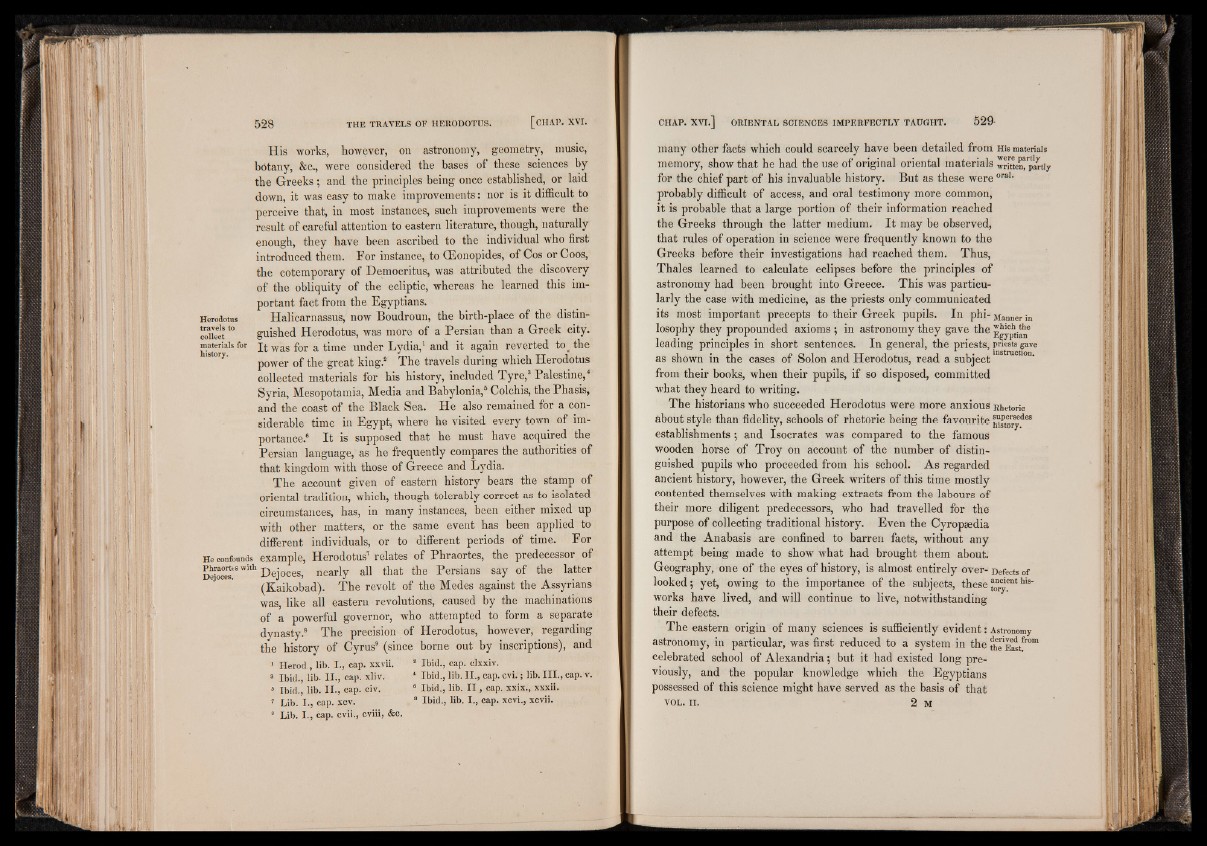
His works, however, ou astronomy, geometry, music,
botany, &c., were considered the bases of these sciences by
the Greeks; and the principles being once established, or laid
down, it was easy to make improvements: nor is it difficult to
perceive that, in most instances, such improvements were the
result of careful attention to eastern literature, though, naturally
enough, they have been ascribed to the individual who first
introduced them. For instance, to CEonopides, of Cos or Coos,
the cotemporary of Democritus, was attributed the discovery
of the obliquity of the ecliptic, whereas he learned this important
fact from the Egyptians.
Herodotus Halicarnassus, now Boudroun, the birth-place of the distin-
«Siectt0 guished Herodotus, was more of a Persian than a Greek city,
materials for Jt was for a time under Lydia,1 and it again reverted to a the
power of the great king.8 The travels during which Herodotus
collected materials for his history, included Tyre,3 Palestine,4
Syria, Mesopotamia, Media and Babylonia,5 Colchis, the Phasis,
and the coast of the Black Sea. He also remained for a considerable
time in Egypt, where he visited every town of importance.
6 It is supposed that he must have acquired the
Persian language, as he frequently compares the authorities of
that kingdom with those of Greece and Lydia.
The account given of eastern history bears the stamp of
oriental tradition, which, though tolerably correct as to isolated
circumstances, has, in many instances, been either mixed up
with other matters, or the same event has been applied to
different individuals, or to different periods of time. For
He confounds example, Herodotus7 relates of Phraortes, the predecessor of
Dej^TWi* Dejoces, nearly all that the Persians say of the latter
(Kaikobad). The revolt of the Medes against the Assyrians
was, like all eastern revolutions, caused by the machinations
of a powerful governor, who attempted to form a separate
dynasty.8 The precision of Herodotus, however, regarding
the history of Cyrus9 (since borne out by inscriptions), and
1 H e ro d , lib. I ., cap. xxvii. 8 Ibid., cap. clxxiv.
3 Ibid., lib. I I ., cap. xliv. 4 Ibid., lib. I I ., cap. c v i.; lib. I I I . , cap. v.
5 Ibid., lib. I I ., cap. civ. 3 Ibid., lib. I I , cap. xxix., xxxii.
7 Lib. I., cap. xcv. 8 Ibid., lib. I ., cap. xcvi., xcvii.
9 Lib. I ., cap. cvii., cviii, &c.
many other facts which could scarcely have been detailed from His materials
memory, show that he had the use of original oriental materials written*partiy
for the chief part of his invaluable history. But as these were oraL
probably difficult of access, and oral testimony more common,
it is probable that a large portion of their information reached
the Greeks through the latter medium. It may be observed,
that rules of operation in science were frequently known to the
Greeks before their investigations had reached them. Thus,
Thales learned to calculate eclipses before the principles of
astronomy had been brought into Greece. This was particularly
the case with medicine, as the priests only communicated
its most important precepts to their Greek pupils. In phi- Manner in
losophy they propounded axioms; in astronomy they gave the
leading principles in short sentences. In general, the priests, priests gave
as shown in the cases of Solon and Herodotus, read a subject °*
from their books, when their pupils, if so disposed, committed
what they heard to writing.
The historians who succeeded Herodotus were more anxious Rhetoric
about style than fidelity, schools of rhetoric being the favourite
establishments; and Isocrates was compared to the famous
wooden horse of Troy on account of the number of distinguished
pupils who proceeded from his school. As regarded
ancient history, however, the Greek writers of this time mostly
contented themselves with making extracts from the labours of
their more diligent predecessors, who had travelled for the
purpose of collecting traditional history. Even the Cyropsedia
and the Anabasis are confined to barren facts, without any
attempt being made to show what had brought them about.
Geography, one of the eyes of history, is almost entirely over- Defects of
looked; yet, owing to the importance of the subjects, these8““ent fais‘
works have lived, and will continue to live, notwithstanding
their defects.
The eastern origin of many sciences is sufficiently evident: Astronomy
astronomy, in particular, was first reduced to a system in the th^Eas/™111
celebrated school of Alexandria; but it had existed long previously,
and the popular knowledge which the Egyptians
possessed of this science might have served as the basis of that
vol. ii . 2 m